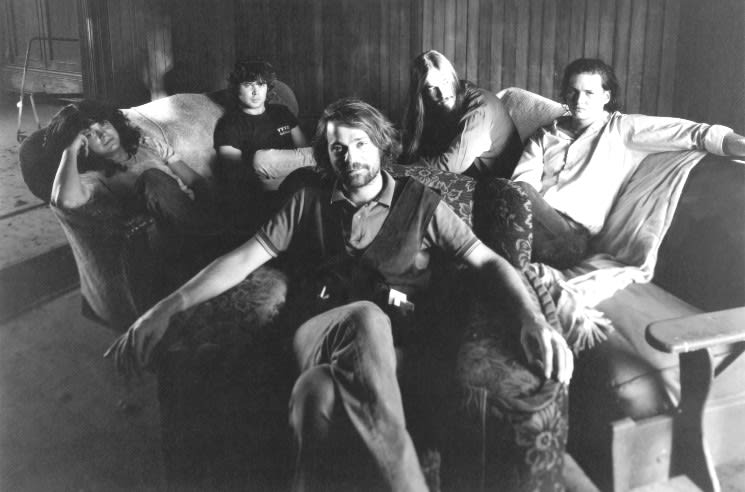The Tragically Hip's second album Road Apples, named for horse droppings, is anything but. Having recorded 1989's Up to Here in Memphis, the band traveled even further south to New Orleans for their sophomore turn — a ripened live act that entered Daniel Lanois's Kingsway studio to come away with a formative bushel of bluesy rock that felt looser, grittier than that of their debut. The recently unearthed Saskadelphia, rarities picked from unvaulted session tapes, lends credence to this. It is the sound of an eager group, tireless long before "Tired as Fuck," ready to play with atmosphere and aggression to soundtrack their vocalist's quickly developing pen.
Aiming to capture the sound and feeling of the band's live performances, producer Don Smith set the band up at Kingsway as if it were just another gig, with stage monitors in place of individual sets of headphones. The method led to material that forms what remains the Hip's hardest rocking set of songs. Where Up to Here opened in contemplative fashion, "Little Bones" begins with some wry picking before calling attention to Downie heralding the arrival of Bourbon Street revellers.
It's an energy that persists in his smirking delivery through the two-note groove of "Twist My Arm" and the impassioned storytelling of "Three Pistols." "Born in the Water" and "On the Verge," a kicking pair in the key of E, see Paul Langlois push his backing vocals to their limit while Rob Baker lets loose some plucky leads. Saskadelphia inclusions like "Not Necessary" and "Crack My Spine Like a Whip" further prove how driven the young band were.
While propulsive rock is very much what drives Road Apples, the Hip also spawned two of their most beloved songs through slowing things down and dialling down the volume. The bluesy waltz of "Long Time Running" is solid, soft enough to leave Downie's lyrics — whether romantic or relieved — to shine, while the elegiac "Fiddler's Green" offers similar treatment as courtly guitars are underpinned by a subtle, singular drum and harmonica.
If quietude wasn't the explicit direction, more dynamic songwriting might have been. "Cordelia," among their best songs that isn't a single, again begins with that curious picking before Downie and the band blow it wide open with easy-riding twin-guitar action. You can feel that moment of band synergy when "The Luxury" shakes off its jazz slink and heads for rockier territory, and in that space in the second bridge of "Little Bones" after Downie proclaims, "Nothing is dead down here, it's just a little tired."
Within the Hip's Road Apples material are the seeds of Downie's poetics of Canadian places and events that have endeared the band to listeners across the country. Most notably, it's "Born in the Water" that invokes the Sault Ste. Marie language resolution of 1990, which made English the sole working language of the government — or as the band put it, "passing laws, just because." "Three Pistols" — one of Downie's best performances on the album — is both exuberantly delivered tales of painter Tom Thomson and something of a titular throw to the small Quebec town of Trois-Pistoles, to this day boasting a population of just under 3,500.
More recently, the Saskadelphia inclusion "Montreal" concerns the misogynist École Polytechnique massacre, with lyrics like "Don't you worry / Her mother's going to make her look good" bringing imagery of a morgue to mind. Sometimes, Downie is able to capture the cultural symbols in a single lyric, like when he spots fleur-de-lis tattoos in "The Luxury" or looks to "drop a caribou" into a payphone on "Long Time Running."
Having already been minted as "Most Promising Group of the Year" by the Juno Awards ahead of recording Road Apples in 1990, the Tragically Hip further established themselves as one of Canada's foremost young rock powers to make good on that distinction. Shortly after its 1991 release, Road Apples marked the band's first of 11 No. 1 albums in Canada, joining Bryan Adams and Tom Cochrane as the only homegrown talent to achieve the feat that year.
The Hip's sophomore release produced some of their most enduring work, with half the album's material appearing on celebrated double-disc hits compilation Yer Favourites. On what would end up being the band's final tour in 2016, seven different Road Apples songs were kept in regular setlist rotation for fervent fans across Canada. Having already attained diamond sales status in 2017, Road Apples is now rolling its way to double diamond certification, while its legacy stands to grow some more with this year's expanded reissue, due November 12 via Universal Music Canada.
'Road Apples' at 30: The Moment the Tragically Hip Became CanRock Legends
The first of the band's 11 No. 1 albums introduced many of their now-classic trademarks

Photo: Jim Herrington
BY Calum SlingerlandPublished Oct 12, 2021



